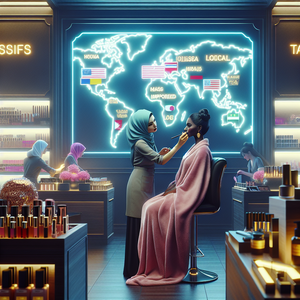
How Tariffs Are Redefining Beauty Careers: 15 Roles Evolving in a Shifting Market
The beauty industry, globally renowned for its skincare, makeup, and personal care innovations, is undergoing a profound transformation. A key driving force behind this change is the imposition of tariffs on imported goods, which range between 10% and 25%, particularly targeting materials and products sourced from regions like China, Canada, and the European Union. These tariffs have sent ripples through the sector, creating significant challenges for manufacturers and consumers alike. Beauty brands are grappling with rising costs for raw materials, packaging, and finished goods, which has led to higher retail prices and slimmer profit margins. In response, the industry is pivoting toward solutions such as investing in domestic production, exploring alternative sourcing options, and prioritizing sustainable innovation. Compounding these shifts is the impact of new regulations like the Modernization of Cosmetics Regulation Act, which has introduced stricter rules for importing and exporting cosmetic products. These factors are not only reshaping corporate strategies but are also redefining career opportunities within the beauty sector. Professionals across supply chain management, compliance, product development, and marketing are adapting to meet these new demands, while companies are creating roles to address the challenges posed by tariffs.
Job Summaries:
Supply Chain Analyst – Beauty Sector:
- Supply Chain Analysts mitigate financial pressures caused by tariffs.
- Identify suppliers in tariff-exempt regions.
- Negotiate cost-effective contracts.
- Optimize supply chains to reduce expenses.
- Explore sourcing packaging materials from Vietnam instead of China to bypass a 25% tariff.
- A degree in supply chain management, logistics, or business is essential.
- Proficiency in data analytics and problem-solving is required.
Regulatory Compliance Specialist:
- The constantly shifting tariff landscape has heightened the need for vigilance in regulatory compliance.
- These specialists ensure beauty brands adhere to import/export laws and avoid costly fines or delays.
- For instance, a compliance expert might guide a company through the updated requirements of the Modernization of Cosmetics Regulation Act while monitoring tariff adjustments.
- A background in law, regulatory affairs, or international business is critical, and certifications like RAC (Regulatory Affairs Certification) can enhance career prospects.
Packaging Engineer:
- With tariffs increasing the cost of imported materials, Packaging Engineers are tasked with designing innovative, sustainable, and cost-effective packaging solutions.
- For example, a beauty brand might shift from imported glass containers to locally sourced biodegradable alternatives.
- Engineers in this role require expertise in materials science and a degree in engineering or packaging science.
Global Sourcing Manager:
- Global Sourcing Managers play a pivotal role in navigating tariff-induced supply chain complexities.
- They evaluate suppliers in non-tariff regions, renegotiate contracts, and ensure the quality and consistency of materials.
- Success in this role demands strong negotiation skills, a deep understanding of international trade, and a degree in supply chain management or business.
Cosmetic Chemist:
- Tariff-related shortages of key ingredients are pushing Cosmetic Chemists to innovate.
- A chemist might reformulate a best-selling moisturizer using locally sourced, sustainable ingredients to circumvent tariffs.
- A degree in chemistry, chemical engineering, or cosmetic science is required.
- A thorough understanding of regulatory compliance is required.
Trade Policy Analyst:
- Trade Policy Analysts provide critical insights into the impact of tariffs on market trends.
- They research trade agreements, assess risks, and devise strategies to protect beauty brands from financial losses.
- For example, they may analyze new trade policies to help a company lobby for reduced tariffs.
- A background in economics, political science, or international relations is essential, with strong analytical skills being a must.
Customs Broker:
- Customs Brokers ensure smooth import and export operations by navigating complex tariff regulations.
- They prepare documentation, classify goods, and coordinate inspections, ensuring beauty products reach their destinations without delays.
- A U.S. Customs and Border Protection (CBP) license is mandatory, and expertise in international shipping is invaluable.
Product Development Manager:
- Rising material costs due to tariffs have forced Product Development Managers to think creatively.
- They collaborate with chemists and designers to develop cost-effective yet high-quality products.
- For instance, a manager might oversee the launch of a budget-friendly skincare line using locally sourced ingredients.
- Strong project management and product innovation skills are essential.
Marketing Strategist – Beauty Brands:
- Tariffs that drive up prices demand a shift in how beauty brands communicate value.
- Marketing Strategists are crafting campaigns that emphasize domestic production, sustainability, or premium quality to justify price increases.
- For example, a campaign might highlight that a product is “proudly made in the USA” using locally sourced materials.
- Creativity, analytics, and digital marketing expertise are key for this role.
Sustainability Consultant:
- As brands seek eco-friendly solutions to counteract tariff costs, Sustainability Consultants are gaining prominence.
- By recommending sustainable materials and reducing supply chain emissions, they help brands appeal to environmentally conscious consumers.
- A background in environmental science or sustainability is critical, along with project management expertise.
Export Sales Manager:
- To offset losses in tariff-heavy markets, Export Sales Managers focus on expanding into regions with more favorable trade conditions.
- They build relationships with international distributors and create competitive pricing strategies.
- Experience in international sales and a degree in business or marketing are key qualifications.
Logistics Coordinator:
- Logistics Coordinators optimize transportation and inventory management to minimize the impact of tariffs.
- They might reroute shipments to avoid customs delays.
- They explore cost-efficient shipping methods.
- Organizational skills and experience in supply chain management are vital for success in this role.
Economic Analyst – Beauty Sector:
- Economic Analysts measure the financial effects of tariffs on the beauty industry and provide actionable insights.
- They might forecast how a 15% tariff on packaging materials will affect profit margins and recommend alternative pricing strategies.
- A degree in economics or finance is required.
- Proficiency in data analysis tools is required.
Quality Control Specialist:
- As brands experiment with new materials to sidestep tariffs, Quality Control Specialists ensure products remain consistent and meet regulatory standards.
- For instance, they might test a reformulated lipstick for durability and safety.
- A background in chemistry, biology, or quality assurance is essential for this role.
Retail Buyer – Beauty Products:
- Retail Buyers must adapt to rising prices caused by tariffs by negotiating with suppliers and identifying affordable alternatives.
- For example, they might source a new, cost-effective skincare brand from a tariff-free market.
- Strong negotiation skills and experience in merchandising are crucial for this role.
The beauty industry’s response to tariffs highlights its ability to innovate and adapt in the face of economic challenges. For professionals, these shifts offer opportunities to expand their skill sets in areas like global trade, compliance, and sustainability. Job seekers aiming to thrive in this environment should consider pursuing certifications, gaining expertise in international trade, and staying informed about regulatory changes. By embracing these challenges as opportunities, individuals can position themselves for success in a dynamic and evolving beauty market. Explore job boards, industry platforms, and company websites to uncover roles that align with your skills and interests in this changing landscape. The beauty sector’s transformation is paving the way for rewarding, future-focused careers.
Explore More Jobs
